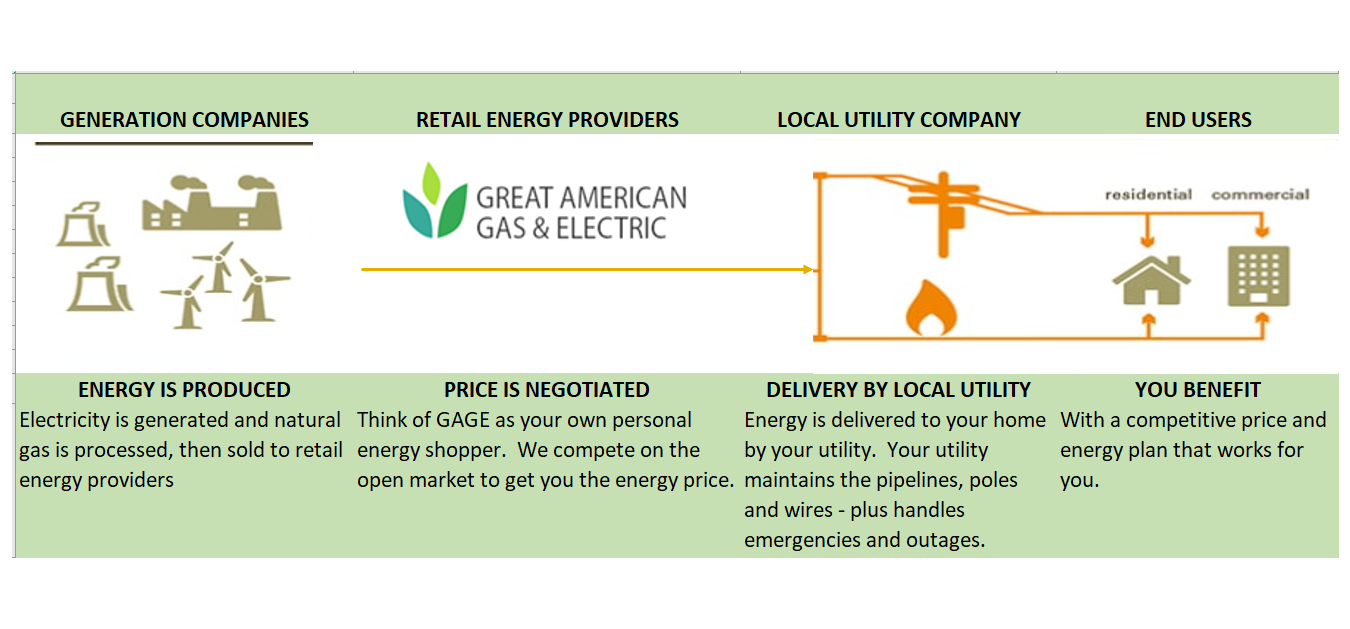Deregulation
Why is there freedom to choose an energy supplier?
Customers have the freedom to choose where they shop for groceries, which company will provide their insurance needs and where to purchase their cars. Over the last several years, state regulatory agencies have made the decision to deregulate the energy industry allowing customers to choose their electricity and natural gas energy supplier.
When energy suppliers compete in a deregulated market, consumers have options and benefit from selecting a program that best suits their budget and their energy needs.
How does deregulation work?
If customers have a home or business in a state where energy supply is deregulated (like New York, New Jersey, Ohio, or Maine), they can decide which company will supply their energy – the local utility or a state licensed energy supplier.
- First, electric and natural gas companies generate electricity or transport gas through their pipelines.

2. Second, energy suppliers like GAGE buy power or natural gas at the best price on the open market.

3. Third, local utilities continue to distribute and transport electricity and natural gas to homes and businesses. They are responsible for the maintenance of lines and infrastructure and provide emergency services or repairs during times of outages.

4. Last, consumers have the freedom to choose their own energy supplier with seamless switching and no disruption to their homes’ or businesses’ energy needs.
 .
.
Great American Gas and Electric (“GAGE”) has a friendly enrollment process, which makes switching supply service a smart, easy, and seamless experience.
Who oversees everything?
Each state manages an agency that regulates rates and service while looking out for the interests of customers.
In NY, the New York Public Service Commission regulates and oversees the electric, gas, water, and telecommunication industries as part of the Department of Public Service (DPS).
In NJ, the New Jersey Board of Public Utilities (NJBPU) oversees the regulated utilities providing natural gas, electricity, water, telecommunications, and cable television. NJBPU’s five-member Board addresses issues of consumer protection, energy reform, deregulation of energy and telecommunications services and the restructuring of utility rates to encourage energy conservation and competitive pricing in the industry. It also monitors utility service and responds to consumer complaints.
In OH, the Public Utilities Commission (PUCO) regulates a wide variety of public utilities including electricity, natural gas, pipelines, heating and cooling, telephone services, waterworks, wastewater, railroads, household goods carriers, towing companies, water transportation, hazardous materials carriers, and commercial transportation carriers. The PUCO ensures that all residential, business, and industrial utility consumers have access to adequate, safe, and reliable utility services at a fair price while facilitating an environment that provides competitive choices.
In ME, the Maine Public Utilities Commission (MPUC) regulates the various utilities of the state of Maine. The MPUC ensures that customer protections are being followed and fair customer service is being provided to the consumers in the state.
In MA, the Massachusetts Department of Public Utilities (DPU) is responsible for the oversight of investor-owned electric power, natural gas, and water utilities in the Commonwealth. The DPU ensures that utility consumers are provided with the most reliable service at the lowest possible cost.




